Hello Mr. Akın. Welcome to the sixth of Winemaker's Dinner events by Lara Barut Collection, where we bring selected Turkish winemakers together with our guests.
At this event, where we offer special wine tastings accompanied by gourmet delicacies from the cuisine of Lara Barut Collection with different guests every month, I would like to listen about the inspiring story of Selendi wines. Can you tell us how the idea of turning your hobby into a business came about.
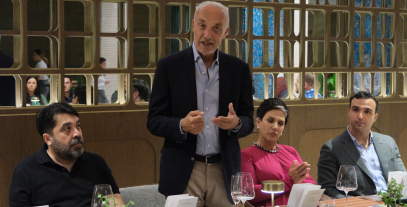 I decided to retire in 1995. During this period of time, I tried to find out how I could pursue my interests and hobbies. I have a friend in Akhisar and we frequently visit his farm. I told him that I wanted to establish a farm, a vineyard, and asked for his help to find land.
I decided to retire in 1995. During this period of time, I tried to find out how I could pursue my interests and hobbies. I have a friend in Akhisar and we frequently visit his farm. I told him that I wanted to establish a farm, a vineyard, and asked for his help to find land.
In fact, the story started with those words. I think it was 1997 when we had the opportunity to purchase the land where we established the vineyard. We purchased it.
Selendi Sarapları started its journey in 2000 in our first vineyard. Then, it continued on the new vineyards we purchased on Sarnic plateau, which is 850 meters above sea level. It has been yielding high-quality wines for exactly 22 years with its vineyards, which improves every day. We made a family decision on the first day we started this business. The soil of Akhisar deserves a distinctive wine. And we made it. We grew our own grapes in our own vineyard. When we first started this business, we managed the vineyard in consultation with Jean Luc Colin. We have been operating under the management of Andrea Paoletti since 2010. We together bear full responsibility from the pruning of the vineyard to pesticide spraying and care.
Most importantly, we established our winery right beside of our vineyard. This is called winemaking of chateau-style in winemaking worldwide. In other words, we did not load the grapes we picked on trucks and transport them for miles. We collected them in small baskets. We treated each of the grapes with special care in our winery.
Drinking high-quality wine is a lifestyle and a quite special pleasure for us as a family. We started this business to show that we can make good wine in our country. We, together with the local people, have grown our grapes and established our facilities. We have made our wines with great efforts in a family environment in our vineyards and facilities. We are so happy to put these difference-making wines on the market.
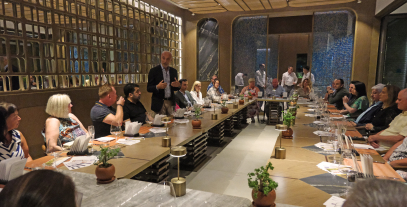 You could also pursue a less effort requiring hobby after retiring. Why did you choose wine? When you look back, have there been times when you thought that there was no need for such tiredness?
You could also pursue a less effort requiring hobby after retiring. Why did you choose wine? When you look back, have there been times when you thought that there was no need for such tiredness?
I have been interested in tasting and drinking wine since time immemorial. I have tasted so many different wines in so many different parts of the world and talked with experts. Viticulture and making wine relax me. We, as Selendi, make prestigious and top-quality wines, and our wines are immensely appreciated in the market. As the quality of Selendi increases over time, it is appreciated more and more. So I have never looked back and thought like this. It gives me a great pleasure that our wines are admired and people love to drink them.
How would you describe your wine that finally comes out of all your efforts? What are the characteristics that distinguish Selendi wines?
There are 200 wine-makers in Turkey. Only 5 of them hold organic viticulture certificate. This is very important for us. Selendi is a high-quality wine made with chateau style and by organic farming. We are different in that we, at all times, make wine with special care by putting our sustainability perspective in the center, without harming nature. The whole process, from management of the vineyard to wine-making, takes place with great attention. Grapes, which are fully grown in our own vineyards, are used, and they are taken from the vineyard to the winery, which is situated in the middle of our vineyard. Then they are hand-sorted one by one with great attention. Bottling and storage take place in our own facilities. This is called chateau-style wine-making.
Grapes from our own vineyard are hand-picked in the early hours of the morning, before the sun rises, and collected in 13-kilogram baskets. They are taken to the winery without the grapes getting smashed, and bunches are delivered one by one to the conveyors. Dry, green or rotten ones are collected by hand-sorting by a team consisting of eight people standing in both sides of the conveyor. The bunches are separated from their stalks by the stalk separator. In addition, after approximately 75% of the stalks are removed, the last control takes place by removal of the remaining small stalks sticked on the grapes by eight other people situated in both sides of the additional conveyor. Another conveyor belt carries grapes up to the fermentation tank, and then an equipment crushes and unloads the grapes into the tank.
It is extremely important that the grapes go into production immediately after being cut. Transportation of the grapes for long distances after they are cut brings the risk of sun exposure and being crushed during transportation. And this means compromising on quality.
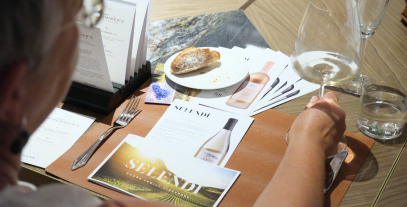 Fermentation takes place in tanks, double sides of which are made of stainless steel, allowing cooling in between times. Winemaking takes places under the management and supervision of the Oonologist (winemaker) Andrea Paoletti. The wine is taken from the fermentation tanks into new oak barrels imported from France. Depending on the intermediate tastings, Selendi wines are aged in barrels for at least 12 months. It is ensured that the temperature is 13 degrees and the humidity is 70% twenty-four hours a day in the cellar, where the barrels and bottles are kept. Wines are filled into special bottles and stored horizontally by natural corks imported from France. Controls are made as required and reported in our laboratory located in our winery throughout the entire production process and stages. Our winery is a modern and hygienic wine-making facility, which was extremely appreciated by the experts from the Tobacco and Alcohol Market Regulatory Authority as a result of the inspections carried out. It obtained the HACCP certificate and started top-quality production as a quality standard. We are also ecocert-certified, which shows the organic and vegan commitment. No food of animal origin is used. Fighting with nature is through completely natural ways. No chemicals are used. Experts coming from France perform the required analyzes and provide such certificates. The production method we applied during our first production periods was not organic. We have been managing entire process accordingly since 2010, when we put into use new vineyards.
Fermentation takes place in tanks, double sides of which are made of stainless steel, allowing cooling in between times. Winemaking takes places under the management and supervision of the Oonologist (winemaker) Andrea Paoletti. The wine is taken from the fermentation tanks into new oak barrels imported from France. Depending on the intermediate tastings, Selendi wines are aged in barrels for at least 12 months. It is ensured that the temperature is 13 degrees and the humidity is 70% twenty-four hours a day in the cellar, where the barrels and bottles are kept. Wines are filled into special bottles and stored horizontally by natural corks imported from France. Controls are made as required and reported in our laboratory located in our winery throughout the entire production process and stages. Our winery is a modern and hygienic wine-making facility, which was extremely appreciated by the experts from the Tobacco and Alcohol Market Regulatory Authority as a result of the inspections carried out. It obtained the HACCP certificate and started top-quality production as a quality standard. We are also ecocert-certified, which shows the organic and vegan commitment. No food of animal origin is used. Fighting with nature is through completely natural ways. No chemicals are used. Experts coming from France perform the required analyzes and provide such certificates. The production method we applied during our first production periods was not organic. We have been managing entire process accordingly since 2010, when we put into use new vineyards.
Another characteristic of our wine is that it does not result in headache the next day after drinking it. Because its sulfur dioxide content is very less. We believe that the oxidation risk is less since it is not a wine intended to be sold in groceries, where it would be stored horizontally and upright on the shelves.
How much is your wine-making capacity? How many bottles do you produce annually? Will you increase the capacity?
We are a boutique wine-maker. We perform two different operations at two different wineries. The first one is the wine-making operation we carry out by organic viticulture from our own grapes under our brand Selendi. It takes place at our new winery in Sarnic. Our annual production capacity here is 85,000 bottles. We have 10 different types of wine. We intend to produce maximum 120 thousand bottles. And we will never produce more. We aim to make high-quality wine by continuing the process we have been carrying out with special care since the first day.
The second one is the operation that takes place for Beyoba wines at the first winery we established. Our capacity here is around 150 thousand bottles as well.
Do all the grapes come from your own vineyards? Do you outsource grapes?
As I mentioned above, we only use grapes, which we grow organically in our own vineyards, for Selendi wines. For Beyoba wines, we outsource high-quality grapes.
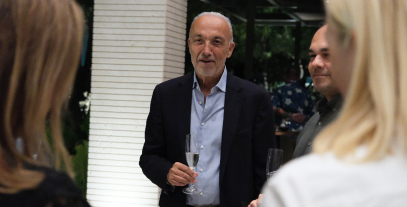 Where does Turkey stand in the global grape production? How much of the grapes grown are turned into wine in our country?
Where does Turkey stand in the global grape production? How much of the grapes grown are turned into wine in our country?
Turkey is the 5th largest grape producer in the world. It mainly takes place in Manisa, the city that is referred to as the capital of grape production. Synthetic and chemical pesticides are widely used in viticulture in this region. Seeing this fact, the former Governor of Manisa started to think of ways to switch to organic agriculture. The chemical pesticides used are known to contain chemicals, which have been reported to be harmful to health.
What are the grapes grown in our country used for? Do we ensure that they create an added value to help our country's economy? What does grape-growing contribute to the economy, as it is carried out on a large scale compared with the world?
Supply of the grapes grown in our country to the market as table grapes and production of sun-dried raisin is a common practice in our country. This kind of production brings lower added value. As a consequence, the contribution to the economy is limited and the farmers engaged in grape-growing complain about low income.
We grow extremely high-quality grapes thanks to organic farming. There are 11 grape varieties: Cabernet Sauvignon, Merlot, Shiraz, Cabernet Franc, Mourvedre, Cinsault, Grenache, Petit Verdot, Chardonnay, Viognier, Narince, Okuzgozu. We make high-quality wine by processing and putting these grapes into industrial production. The grapes create much higher added-value. They have greater contribution to the economy, employment and farmers.
Let's take a look at what larger grape growers do. For example, France. Our cultivated land is 505,000 hectares, while the cultivated land of France is 825 thousand hectares. However, their export revenue is 8.5 billion US Dollars, while ours is 7 million US Dollars. The export revenue amounts to 5.3 billion US Dollars in Italy, 2.4 billion US Dollars in Spain and 2.2 billion US Dollars in Austria. Even though the cultivated land of Austria for viticulture is one-third of ours, it has created much greater added value than us.
When grape is processed and used in industrial production, i.e. for wine-making, the added value increases exponentially. When I speak of this, I am told that wine is an alcoholic drink (with an ABV of 12% and 15%) and it can be harmful to public health. So I compare the healthy life expectancy in France, Italy and Spain, where wine is consumed much more per capita, with that of Turkey. The average life expectancy in Turkey ranges from 71 and 73 years for men, while it is 82 years in France and Italy, and 80 years in Spain. These figures show that wine is not harmful to public health when consumed responsibly.
Countries, grape production rate of which are much lower than that of Turkey, make much greater contribution to their economy and create added value from grapes. High-quality wine production, which is capable of creating added value and crowns grape production, must not be hindered but supported. This is for the benefit of our country.
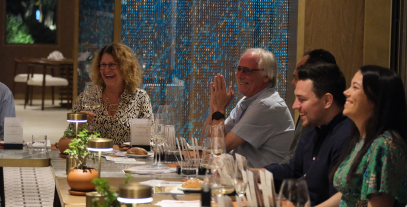 What do you think about the current situation of the agricultural sector in Turkey? Why does agriculture not attract attention? Is agriculture adequately supported? Is technology used?
What do you think about the current situation of the agricultural sector in Turkey? Why does agriculture not attract attention? Is agriculture adequately supported? Is technology used?
Agriculture is a sector of great importance. It is of great importance not only for food safety but also from a strategic point of view. It is not like we pay for it and get it. Turkey is a very important agricultural country. However, when we look at Turkey, the biological and organic value of the soil decreases. According to experts, it must be around 3%, while it is 1.5% in Turkey. I am not an agricultural engineer. But I share with you what I have learned. It is because of improper practices, uninformed and too much use of artificial fertilizers, use of too many chemicals, and pollution of our waters. So, the Ministry of Agriculture must raise awareness towards agriculture and align agricultural policies in this respect, for sure. We make some mistakes.
I long served as the President of WWF Turkey. Climate change is at the door. We talk about global warming. Whether you accept it or not, it's a scientific fact. Turkey is one of the most affected countries. Central Anatolia is one of the most affacted regions in Turkey. Let's look at agricultural activities in Central Anatolia. Water resources in Central Anatolia are gradually depleting. It will deplete further with the upcoming climate change. We cultivate sugar beet in Central Anatolia. However, we have scientifically shown that different crops can be cultivated. Sugar beet absorbs too much water. They take the sugar beet and derive sugar beet from it. And the price of sugar produced is double of the sugar prices in the world. So what is the point? Sugar beet must not be produced there. Different products, which require less water, must be produced there.
For agricultural policies, there are so many things to consider not only in terms of viticulture, but in general. You must consider it scientifically. For example, we realize organic viticulture. Organic farming is extremely effective. Good agricultural practices are available. It is widely used in the world. The consumer shapes them. They say that they are going to avoid buying if certain chemicals are used. I wish it could become widespread in our country as well.
Unfortunately, the industry creating added value is not supported. We are trying to sell the agricultural product derived as it is. We just sell grapes. All we do is sun-dry and sell grapes. We do not want to sell wines made from grapes. We punish the wine because it is an alcoholic drink. We punish its distribution, production, promotion, and everything. The regulations are suitable for it. Other countries create added value by exporting wine. But we consider wine as an alcoholic drink. We do not take advantage of it while we can create added value.
On the other hand, a digital recording and tracking system can be developed to monitor agricultural performance. As in livestock, each vine can also be digitally recorded and monitored.
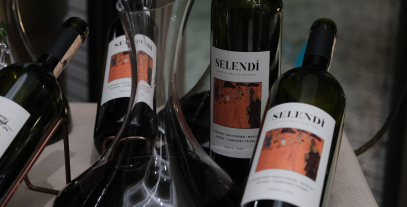 What do you do for more fertile vineyards? Are there any different methods you have tried to apply?
What do you do for more fertile vineyards? Are there any different methods you have tried to apply?
As what we do is organic production, we always fight with natural ways. One of methods we've just started to apply is to make compost from residues of pressed grapes and use it as fertilizer to make vineyards stronger.
With green pruning, we strive for decreasing the grape yield per vine and increasing the quality. We strictly observe what Andrea Paoletti asks us to do.
How does Turkey do in the global wine-making industry in terms of quality and production? How do you evaluate the perspective of Turkey on wine? Does this business bring additional challenges in our country? What is the situation of the wine-makers in our country when compared with the wine-makers in the world?
Unfortunately, Turkey is not famous and known as a wine country. This is because of the policies implemented. Unfortunately, wine-making and wine promotion are not supported. In fact, practices to hinder those are applied. So, it cannot open to the world.
However, the quality of the wines produced in Turkey has been increasing extremely especially in the last 20 years. We hear about it very frequently from foreigners visiting Turkey. We attended a party the other day, and the Consul General expressed it and emphasized the change he realized.
In fact, we touched upon it a little bit while talking about agriculture. The restrictions imposed in accordance with the policies, not supporting or even punishing the industry, which creates added value, can be listed as the main challenges.
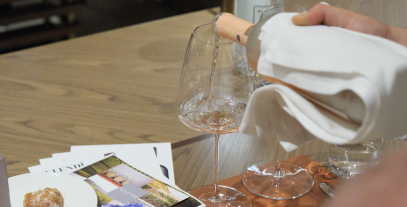 You started wine-making as a hobby and gained an important position. Have you got to the point you targeted? Will you make new investments?
You started wine-making as a hobby and gained an important position. Have you got to the point you targeted? Will you make new investments?
As Selendi, our motto is organic agriculture, giving back to nature what we take from it, sustainability and thus, yielding the best quality products.
Most of our vineyards are organic vineyards situated at an altitude of 850 meters. In Selendi, we perform organic farming by applying methods to enable agriculture to continue and improve in terms of sustainability, and not harm but contribute to the means offered by nature and the organic capacity of nature. We work on a scientific basis. So, when the time is ripe, we collect our grapes by hand into 12-13 kg baskets, and process them in our winery located right next to our vineyard. Our production will never reach up to millions of bottles but a maximum of 120 thousand bottles. Meticulous, chateau-style wine-making. We include pictures of today's Turkish painters on labels of the blend series of our Selendi brand.
As a result of all these efforts, Selendi did not prove us wrong. Later on, our wines improved and gained good positions. Our new products carved out a place in domestic and foreign markets, and we started to receive outstanding international awards. We would like express our endless gratitude to these precious lands, nature and climate, which offer us the best wines.
Who did support you when establishing your vineyard? Did everything turn out as you dreamed? What were the obstacles when making your dreams come true?
After I retired, I searched for what I could and could not cultivate on our land. I worked with an experienced and well-informed Turkish expert. The expert told me that it was not a place suitable for growing wine grapes. I was surprised and asked the reason. He said that the climate is too hot, and that the soil and wind is not suitable, and told me not to start this business. I was so upset, surprised. It was a pity. We actually wanted to establish a vineyard here. But it's also hot in Sicily, Italy, Greece and Spain. So, how do they make wine? It left a question mark. Then, we decided to continue with organic vegetables as we could not establish a vineyard.
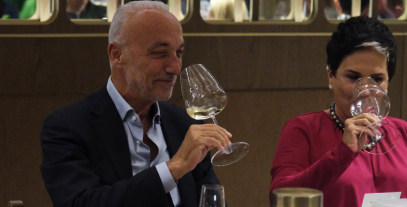 But we needed natural seedlings and roots to grow organic vegetables. I started searching. I met Avi Samir from a seedling company in Israel. We sat and talked with him. He asked me what I wanted to do. I told him that we were going to establish a vineyard here, but we learned that it was not possible. Avi Samir said, "Wait a minute, let's check it. If it's OK with you, I would like to take some soil." And I said OK. Avi Samir came here, took the soil, put it in his bag and went to Ege University. He asked them to provide information about daily temperatures, day-night temperatures, winds and humidity of the last eighty years in this region. Of course, Ege University did not provide such information. So he somehow obtained all possible information and flew to Tel Aviv. After one month, he came back from Tel Aviv. When he came, he asked me to bring two glasses. We brought two glasses. He said, "Soil similar to yours. We are going to taste a wine made in a warmer climate. If you like it, then we can make wine here.". Then, we opened the wine. We tasted the red wine. It was really good. A wine that is comparable with or even better than the fine red wines in Turkey. I said I liked it. He said, "Then this is good news. We can establish a vineyard on this land.".
But we needed natural seedlings and roots to grow organic vegetables. I started searching. I met Avi Samir from a seedling company in Israel. We sat and talked with him. He asked me what I wanted to do. I told him that we were going to establish a vineyard here, but we learned that it was not possible. Avi Samir said, "Wait a minute, let's check it. If it's OK with you, I would like to take some soil." And I said OK. Avi Samir came here, took the soil, put it in his bag and went to Ege University. He asked them to provide information about daily temperatures, day-night temperatures, winds and humidity of the last eighty years in this region. Of course, Ege University did not provide such information. So he somehow obtained all possible information and flew to Tel Aviv. After one month, he came back from Tel Aviv. When he came, he asked me to bring two glasses. We brought two glasses. He said, "Soil similar to yours. We are going to taste a wine made in a warmer climate. If you like it, then we can make wine here.". Then, we opened the wine. We tasted the red wine. It was really good. A wine that is comparable with or even better than the fine red wines in Turkey. I said I liked it. He said, "Then this is good news. We can establish a vineyard on this land.".
Starting from this point, we established a vineyard here with Israeli experts. We installed an irrigation system and of course a deep well pump while establishing the vineyard. We installed drip irrigation systems. We used this drip system to supply the soil with missing minerals and nutrients.
We wanted to supply the grapes we grew to wine-makers in Turkey to turn them into wine. We wanted them to make wine for us. I asked a couple of wine-makers. One said they could not do it. But the other said they could so we delivered the grapes. But later on we realized that the amount of our grapes was so low that they could not process this limited amount of grapes in those tanks and return them as wine to us. It also disappointed us. But in the meantime, we had a vineyard.
I said, "We should somehow establish our own winery.". I never forget the smile on my wife's face when I said this. She was like "Oh no! We start over again. We're drawn into a vortex.". And she was right. I started establishing a winery. I tried to find the best equipment of top quality while establishing the winery. We set up everything, from tanks of the the latest technology to hygienic conveyors, and established the winery here. It was not that easy to do this in Turkey because of various bureaucratic obstacles and restrictions. After overcoming all of these, we managed to establish it. Now we process our own grapes and make wine in our vineyard.
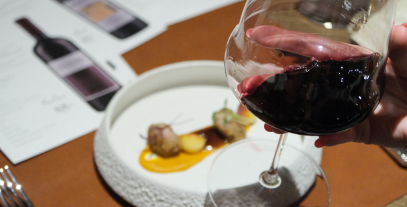 What is the place of wine in your daily life? How much and how do you consume?
What is the place of wine in your daily life? How much and how do you consume?
I especially love red and rosé wine. I prefer a nice chilled Provencal rosé in the summer. I like to have a few glasses a day. I do not drink too much.
I prefer red wine for the rest of the year. I think I drink only one or two glasses of wine two or three days a week. I like trying different tastes and flavors.
What are your hobbies apart from wine?
I love sea. I am a sailor and a sailing athlete. I am an advanced diver. I have dived in more than 270 different points of the world. I'm not currently diving but I've crossed the Pacific Ocean. I have dived so many times. I think the life under the sea is so exciting. I am a former national basketball player. I have writing as a hobby. I have written 3 books. I write to share my experiences with young people. I meet and talk to them.
How effective is doing this business willingly and with passion in obtaining good wine? What are the essentials for success in this business?
As in any business, doing it willingly and with passion is important. Everything started with a passion for us as well. At the beginning, we established the vineyard as a hobby. Growing top quality wine grapes was a passion. But meticulous and dedicated efforts and the commitment to quality made the dream come true. It was a great pleasure to taste the first product. Imagine that you buy a cornfield and it's bare. You plow it and turn it into a vineyard. For two or three years, you take care of it. You water it, protect it from the cold, and prune it. Sometimes, you place a canopy over it to protect it from the sun. And finally the baby grows: Grape. Then you hand-pick it in a feast-like manner with the family helping you, and you do the harvesting. You process it carefully. At the end, you let it rest and take it in barrels. You age it for a year and then taste it. At the end, your product emerges. Not compromising on quality, organic farming, giving back to nature what we take from it and sustainability are must for us.
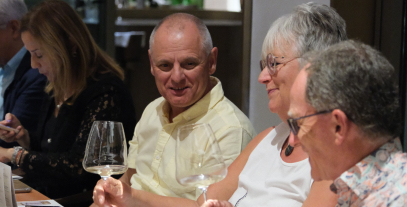 You associate wine-making with social responsibility projects and attach particular importance to education. What would you like to say about the importance that should be attached to education?
You associate wine-making with social responsibility projects and attach particular importance to education. What would you like to say about the importance that should be attached to education?
As you said, education is very important to me. We built a girls' vocational high school named after my wife in Akhisar. I founded various educational institutions and take part in the management of these institutions. To the best of my ability, I strive to grant scholarships to young people to ensure that they receive proper education and develop themselves. School is a part of our approach in this respect. Throughout our marriage of 47 years, my wife never asked me for anything. One day, when my wife Gulin was still alive, she wanted a school to be named after her. And I tried to do my best. Thankfully, my friends helped me too. Garanti Bank provided great support. They helped me establish the Serdar Bilgili Photography Workshop and Atilla Turkmen Textile Workshop. Finally, the school, where our bright young girls study, came to reality. After all preparations, we donated it to the Ministry of National Education. There are currently 1350 girls studying at this school.
Girls receive education about home and home management and gain professional knowledge at the school, which is equipped with the latest technology. Students can utilize computer labs and Internet all day long. Providing education in the fields of computer, graphic design, foreign language, textile, food and hospitality, handicrafts and pedagogy, the school has already had its first students graduated. Even though we donated it to National Education, we still provide support for the school. I give speech in the companies in exchange for donations to the school.
Neither my wife nor I were born to wealthy families. We started from scratch and managed to reach this point. I think that those who manage to grow like us must allocate the money they earn to the society and the country at some point in their lives. We considered this school as our responsibility to society and our country. Thankfully, we managed to fulfill our responsibility. Ensuring that our girls in Akhisar study, have a profession and stand on their own feet, and that future mothers are strong and well-grounded individuals, and sustainability in the society are very important. I hope this model will set an example for youth...
My perspective on education is that today’s students are the leaders of the future. This is the briefest and clearest way to describe the importance of education for me. Quality in education is a must in order to ensure that young people receive education through the most advanced methods, without falling behind the times, and to move forward in development.
Unfortunately, the situation in our country is not good at all. The method, which is based on rote-learning, is inadequate as it does not develop analytical intelligence of young people. We need to take remarkable steps in this respect as soon as possible. When we look at the students abroad, the students not only in UK or USA but also in Korea, Taiwan, China and India receive education in the most equipped educational institutions through the most advanced methods. It brings creativity and inventions. There is still a long distance to cover for us. Young people, who have fallen behind in science courses when compared with the rest of the world, cannot access innovations globally. We need to take science education further. With the education policies today, we will unfortunately fall behind in education and development.
Recommended For You
The Best Local Flavors of Anta...
Known as the jewel of the Medi...
Read MoreThe Most Popular Local Dishes ...
Gaziantep is known as one of T...
Read MoreQuick and Tasty: Open-Faced Br...
After a long, busy day, your t...
Read More